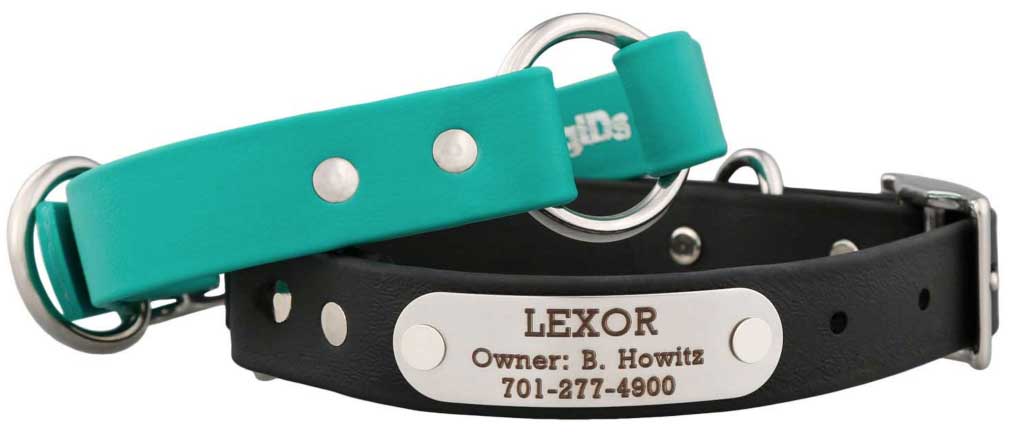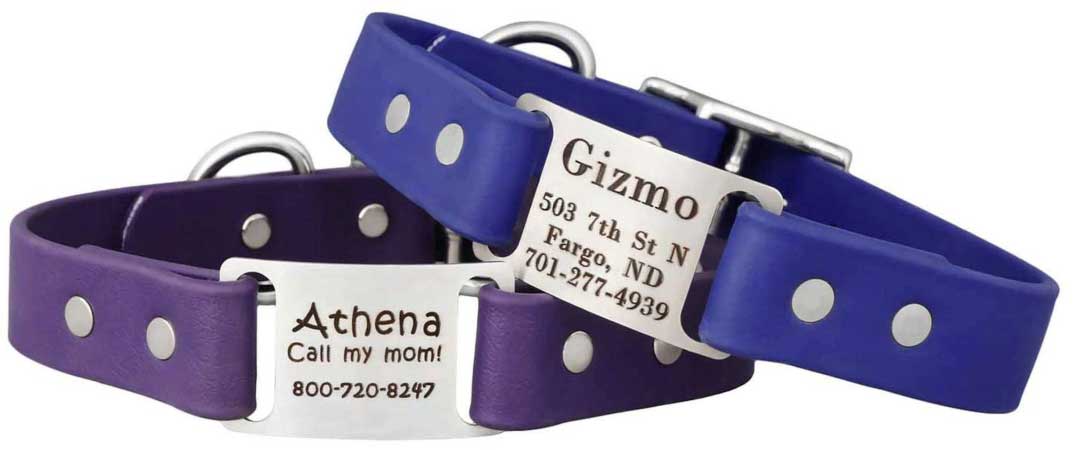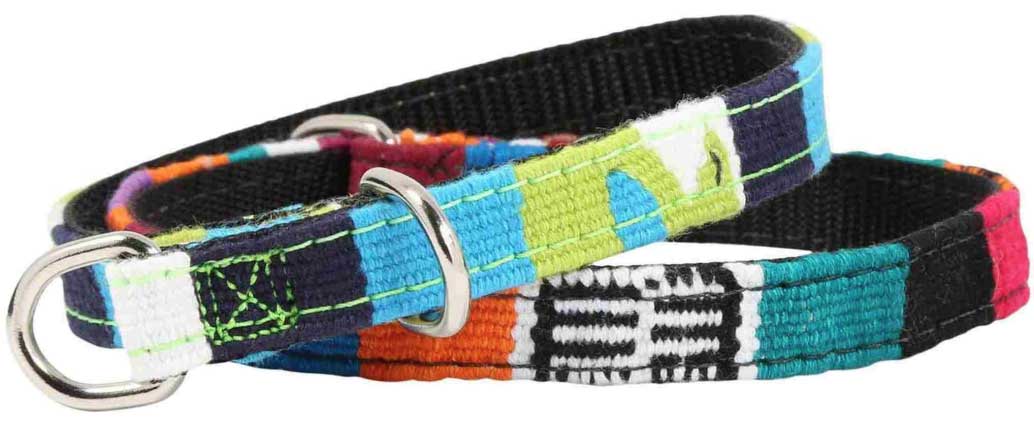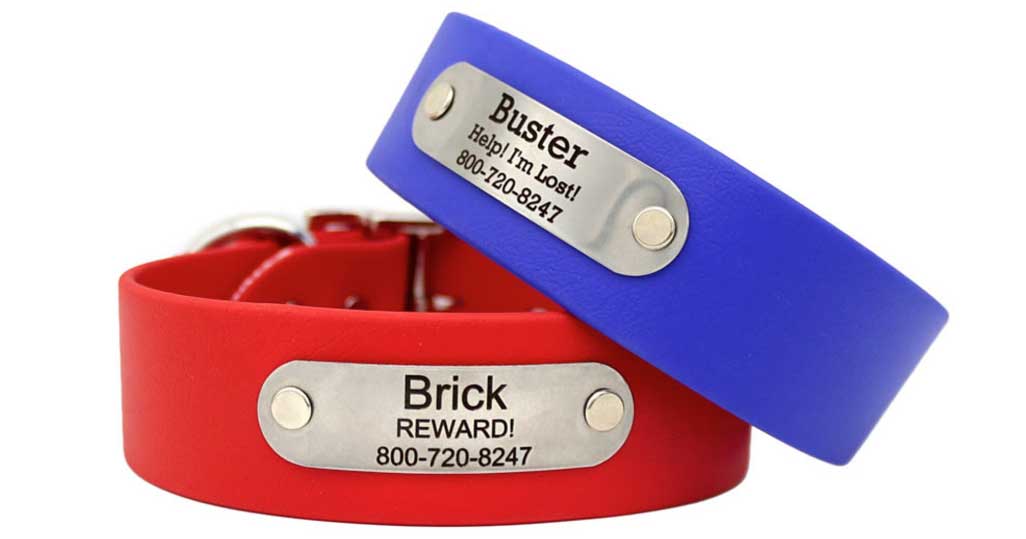Types of Dog Collars Defined

Types of Dog Collars Defined
Your dog is a member of the family. They deserve to be treated with dignity and respect, just like any other member of your household. That's why we want you to know about all the different types of collars out there so that you can make an informed decision about what collar fits best for each situation.
Flat Traditional or Standard Collars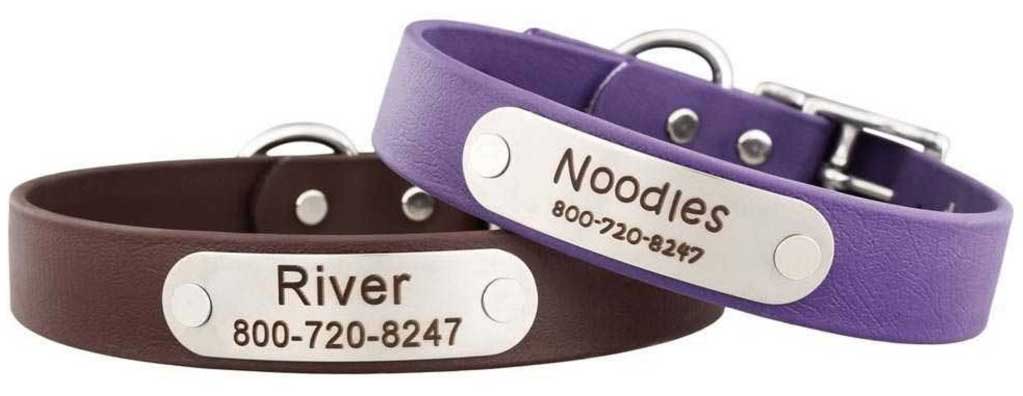
Traditional standard collars are generally built with flat strap made out of leather, nylon webbing or polypropylene webbing. A belt type buckle is usually used with a prong that fits into adjustment holes in the collar strap. Another standard component built into these collars is a D or dee ring that is used for attaching a leash to and also attaching dog tags to. Some collars of this type also have a "keeper" for the billet or extra strap that passes through the buckle to hold it close to the rest of the collar strap. When most people think of dog collars, this is the tried and true design that's been around for a long, long time. Check out our personalized standard collars here!
Center Ring or Safety Collars
Center ring collars, which many call safety collars, are a type of dog collar that has a single ring in the center of two straps. The center ring is a pivot point that helps relieve pressure if the collars ever gets caught on something. The center ring pivot point also helps a dog wiggle out of the collar if they do get stuck on an obstacle like a fence or tree branch. Center rings are best suited for dogs who spend a lot of time in the field or in other environments where obstacles are prevalent.
Many people love safety collars because the center ring is a really convenient access point to attach a leash without searching for the D ring. This is probably the reason why these collars have become more popular rather than just being used for working dogs.
Check out our personalized safety collars here!
Slip Collars and Martingale Collars
Slip collars are great for small dogs since their low body mass does not create a lot of cinch force and hence do not choke the dog. Large dogs on the other hand create a lot of cinch force and can cause damage to their neck and throat. We strongly discourage the use of slip collars with large dogs unless they are very well trained. They fit around their necks and tighten when pulled on by the handler, but can easily be loosened by simply releasing pressure on the leash. This makes them ideal for quick corrections or if your dog is trying to run off somewhere else in a hurry!
Martingale collars, backout collars or limited slip collars as some refer to them, are best suited for medium to large breeds because the tightening or slip action only travels so far and tightens the collar so much. Martingale collars also tighten more evenly around a dog's neck when pulled. They have a limited amount of cinch travel as opposed to slip collars without a slip stop in place.
These humane "choke" collars called martingale collars have been shown to reduce likelihood of injury by reducing stress levels and encouraging calming behaviors like panting rather than barking at other animals when excited. They are also a humane way to make corrections during training sessions.
Many people also prefer martingales for dog breeds with wider necks and smaller heads such as site hound breeds (greyhounds, whippets, etc.) because the tightening action makes it less likely for the collar to slip over the dog's head and come off. Hence, the term "no-backout collar". Check out our personalized martingale collars here!
Waterproof Collars
Waterproof dog collars are usually made with nylon or polypropylene webbing as the core and then coated with a synthetic waterproof coating. They are mainly marketed for their waterproof qualities but there are many other benefits to waterproof collars. First and foremost, they are odor resistant. We all know how stinky an old nylon or leather collar can get, especially if your dog enjoys being in water, mud or snow. And if your dog is known to roll in the stinkiest things he or she can find at times, you're probably going to be buying many collars over your dog's life unless they are waterproof. Waterproof collars are so much easier to clean, keeping them looking great and odor free. Many people actually call waterproof collars no-stink collars because of this. Check out all of our waterproof collars here!
Training Collars
The training collars category is very broad and they are used for training purposes. Some examples are slip collars, pinch or prong collars, martingale collars, electronic collars (we strongly encourage positive reinforcement when using electronic collars rather than punishment or shock corrections every time your dog does something wrong), collars with handles on them or just a good solid leather or synthetic collar designated for training.
Many people hear the phrase "training collar" and automatically believe that means electronic or shock collar but that simply isn't true. There are many other types of collars that are used for training purposes. They can be used to train dogs to heel on a leash, sit, stay, and other other obedience commands as well as many other more complex training regimens.
Training collars should not be used as an everyday collar; they're meant for specific training purposes only and you should praise your dog when it's time to put on a training collar. It should be a positive experience every time, not a punishment. It's always good practice to designate one of your dog's collars as a training collar and only wear it during training sessions. When they are used for training only, no matter what type of collar, your dog will also know it's used only for special times when handler and dog are learning to communicate on a deeper level. They'll know it's "work time" and "learning time" when wearing their designated training collar. Check out our training collars here!
Extra-Wide Collars
Extra-wide collars are used for dogs with extra large necks, body mass and pulling strength, such as Great Danes and Mastiffs. These dogs have a lot of neck surface area and pulling strength, so it's important to make sure that their collar doesn't "dig in" to their neck when pulled on. The wider surface area allows more pulling force on a leash without potentially causing damage to their neck area over time.
Extra-wide collars can also be used on dogs with long coats, such as German Shepherds or Golden Retrievers to prevent matting.
Finally, extra wide collars are great for breeds like Great Danes, Greyhounds and other sighthounds like Irish Wolfhounds, Salukis, Whippets, etc. who have long necks. The wider surface area of these collars looks more proportioned when on a dog with a long neck. Find them here.
Dogs Need a Variety of Collar Styles
Dogs need collars for a variety of reasons, including identification, leash attachment and training. Collars are also important for safety, control and behavior problems. In addition to these benefits, a collar can be a special item to your dog and can provide a feeling of comfort to them when it's on their neck. Kind of like a security blanket. The light physical pressure around their neck while wearing a collar can help some dogs feel more secure. Some dogs actually get extremely anxious when their collar is removed.
Conclusion
There are many different types of dog collars and we've just covered a few of the most popular in this article. At dogIDs you can choose from regular width or extra-wide collars, slip and martingale collar styles, training collars, and more, depending on your dog's needs. Each has its own set of benefits and limitations so it's important to understand what they are designed to do before you make a purchase decision.
Explore Popular Articles
-
Homemade Flea, Tick & Mosquito Repellent for Dogs: A Natural Recipe for Pet Parents
Jun 13, 2025Beyond the Buzz and Itch: Protecting Your Pup from Mosquitoes, Fleas, and Ticks As pet parents, we w
-
Can My Dog Eat This? A List of Human Foods Dogs Can and Can't Eat
Jun 04, 2025As loving dog owners, we consider our furry companions members of the family. They share our homes,
-
How Long Are Dogs Pregnant - Tips for Care & Safety
May 15, 2025Congratulations! If you’re reading this, your furry friend is likely expecting a litter of pup


